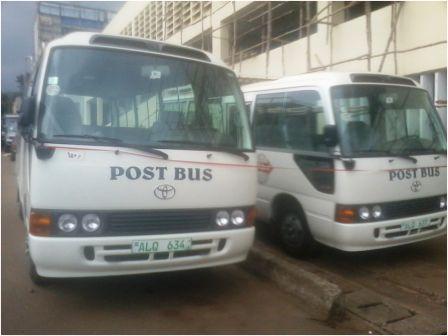City Commuters Face Transport Problem
Looking at Freetown, the capital of Sierra Leone, and one of the smallest cities in West Africa, one wonders why public transportation is still a problem for most people staying on the outskirts and periphery of the city.
The city center though not far removed from the people living in suburban Freetown suffers acutely as a result of an inefficient transport and traffic system.
In the morning hours and in the evening, traveling into and out of the city is a serious problem and entails spending long hours either walking on foot or waiting for vehicles that are usually unpredictable and at most under control of corrupt traffic officers.
Commuters staying in Kissy, Wellington, Calaba Town, and Waterloo have to go through serious strains to arrive at their destination.
Governments both past and present have not made any attempt to solve the problem apart from half hearted operations carried out by the traffic police, but which is essentially to get more money from the hapless drivers of commercial vehicles.
The new traffic system introduced by Police for commercial vehicles plying the east end part of the city has also been described as a lackluster corruption imposed strategy to ensure that police get more bribes from motorists at the detriment of the passengers.
Imagine after a hectic day at work, people have to walk at least two miles to join public transportation either at the Cottage Hospital or Cline Town.
School children are always facing the problem as they have to fight their way both to go to school and to return home at the end of the day.
To add to the problem, commercial drivers have the habit of stopping half way and ordering passengers out, claiming they are avoiding the traffic. This is frustrating and a big problem to the acute lateness of workers generally both in the private and the public sector.
School going kids have been most affected as they have no means of resting so that they will engage in studying at home and in engaging in assignments. Tired and weak after the scramble that they go through daily, school pupils have no further time for books, or further study. While the causes of commercial public transport can be ascribed to bad roads and the narrow carriageways left by the British Colonial masters, it has now been proved that the activities of the police play a significant role in the problem.
According to a mini bus driver, plying the Eastern route, their main problem is the traffic police who have a negative view of commercial vehicles.
The police in unfairly targeting commercial vehicle drivers fail to realize that these are the ones moving the city forward. Commercial vehicles are as important if not even more so than private vehicles as these are the ones serving the people but the police essentially see them in a hostile manner.
Commercial vehicle drivers make up the largest number of inmates in the maximum Pademba Road because of flimsy charges usually based on the refusal of drivers to respect the payment of bribes to police.
While private vehicles are rarely arrested or quizzed on road offences, traffic police see all commercial drivers as the enemies and the ones who should pay the usual cost.
It is rather disappointing when the Inspector General of Police Mr. Brima Acha Kamara recently said that the Traffic Police are corrupt and called on the Anti-Corruption Commission to investigate and arrest any officer found wanting.
For a force that is supposed to set the standards, it is hardly encouraging to realise that the traffic police can never be trusted.
The presence of the newly established Traffic Warden force has also not helped matters as they are contributing to the problem rather than bringing any solution. The right given to them to issue tickets to motorists has opened a Pandora’s box of corrupt practices. The fact is that given authority to a traffic warden to issue tickets is like making them into courts, dishing out punishment without consideration to the other side. Essentially this aspect of the traffic wardens authority is a total disregard to the fundamental concept that a man, or a woman is presumed innocent until proved guilty in a court of law.
Finally, the spate of corruption has caused many people to desist from buying commercial vehicles, pointing out that owning a mini bus or taxi in Freetown is like buying it for the use of traffic police officers.
It is unprofitable to maintain a commercial vehicle in the city and get a profit at the end of the day because the traffic police will expect to have their cut and with maintenance and fuel adding to the expenditure, a lot of people prefer to invest in other means.
Meanwhile the government has not shown any strong commitment in ensuring that the city maintains a regular and an efficient commercial transport system.
Stay with Sierra Express Media, for your trusted place in news!
© 2009, https:. All rights reserved.





